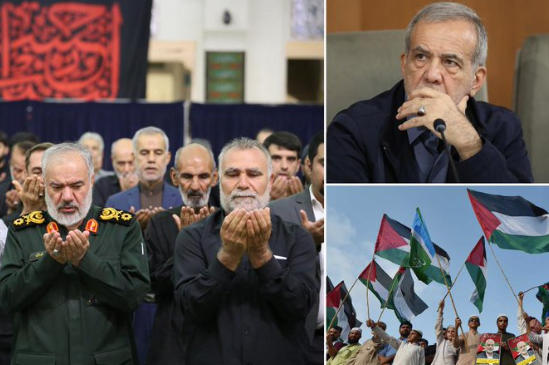Benjamin Netanyahu: “We are in the midst of a fight for our homeland, and we will do whatever it takes to defend our people and our state against any threat from Hamas, Hezbollah, or Iran.”
— Israeli Prime Minister Benjamin Netanyahu, emphasizing Israel’s stance on defense against regional threats.
Iran may be rethinking its plans to retaliate against Israel for the suspected assassination of a top Hamas leader. However, experts are questioning the role that U.S. military assets in the region might have played in this potential change of heart.
“It’s impossible to think Iran is thinking about calming down the situation.”
Amir Fakhravar and Maj. Gen. Glenn Ignazio (Ret.) speak about Iranian retaliation against Israel on Friday’s “Newsline.” @Fakhravar @glenn_ignazio @BiancaDLGarza pic.twitter.com/mRHwPfoPUC
— NEWSMAX (@NEWSMAX) August 9, 2024
For months, the U.S. Navy has maintained a strong presence in the region, patrolling the waters without directly responding to Iranian provocations. Despite this, Tehran is unlikely to be acting out of fear of American reprisals, according to Richard Goldberg, a senior adviser at the Foundation for Defense of Democracies. He suggests that Iran’s Supreme Leader, Ayatollah Khamenei, views the U.S. military presence more as a grand display than a credible threat. Goldberg asserts that this perception will persist until Iran is faced with a substantial military challenge.
Goldberg further argues that the only effective way to restore deterrence is through a combination of sanctions and a clear willingness to take military action. He warns that the alternative—allowing a nuclear-armed, terror-sponsoring regime to operate unchecked—would be catastrophic not only for the Middle East but also for U.S. national security.
Israeli media recently reported that Iran may be stepping back from its initial plans to retaliate against Israel for the assassination of Hamas leader Ismail Haniyeh. Originally believed to have died in a missile strike, later reports suggested Haniyeh was killed by a bomb planted in his room. Despite this, U.S. officials still anticipate a response from Iran, though they believe it may be more measured.
Iran’s Revolutionary Guard, new president disagree on response to Israel after Hamas leader’s assassination https://t.co/pPa1Do3nXG pic.twitter.com/ZFaz1Gnpx8
— New York Post (@nypost) August 10, 2024
State Department spokesperson Matthew Miller emphasized that Washington has been urging other nations to dissuade Iran from launching another attack on Israel. However, recent reports indicating that 12 U.S. warships were deployed to the region in response to escalating tensions have been denied by U.S. officials, who noted that the vessels were already in the area for routine operations.
James Carafano, a fellow at the Heritage Foundation and a former Army veteran, expressed skepticism about the effectiveness of these military deployments in influencing Iran’s decisions. He pointed out that Israel’s precision-strike capabilities, Lebanon’s unstable domestic situation, and the potential for political protests spreading across the globe could all be factors in Iran’s calculations.
Carafano also noted that the U.S. has already deployed significant military power in the Middle East, including the recent addition of F-22 Raptors. This buildup, he says, is a strong statement but may not be enough to alter Iran’s strategic choices.
Matt McInnis, a visiting fellow at the Institute for the Study of War, agreed that the military deployments might support ongoing diplomatic efforts to pressure Iran. He noted that Iran’s neighbors have also been working to dissuade Tehran from provoking a full-scale conflict with Israel. However, McInnis emphasized that the U.S. is facing tough decisions regarding its military posture, having to balance commitments across multiple global theaters.
Waiting game on Iran’s response to Israeli aggression hints ‘big strike’ may be imminent
As the world awaits Iran’s response to the killing of Hamas political leader Ismail Haniyeh, the waiting itself suggests the retaliation will come in the form of a “big strike.”
“The longer… pic.twitter.com/ialu2lu5i9
— Sputnik (@SputnikInt) August 10, 2024
Quotes
- Antony Blinken: “Hamas does not represent the Palestinian people or their legitimate aspirations for dignity and self-determination. They have only brought pain and suffering.”
— U.S. Secretary of State Antony Blinken, condemning Hamas’ actions while reaffirming support for Israel. - Hassan Nasrallah: “Hezbollah stands ready to support the Palestinian resistance and will not allow Israel to dictate the fate of the region unchallenged.”
— Hezbollah leader Hassan Nasrallah, affirming support for Hamas and resistance against Israel. - Ebrahim Raisi: “Iran will continue to support the Palestinian resistance until the liberation of Jerusalem. The unity of the resistance forces is key to defeating the Zionist enemy.”
— Iranian President Ebrahim Raisi, expressing Iran’s ongoing support for Hamas and opposition to Israel. - Antonio Guterres: “The violence must stop. Escalations in the Middle East threaten to spiral out of control, with devastating consequences for all involved. Dialogue is the only path to peace.”
— UN Secretary-General Antonio Guterres, calling for a halt to the violence and urging for peaceful resolution.
Major Points:
- Iran may reconsider its response to the alleged assassination of a Hamas leader, but experts question the influence of U.S. military presence.
- Despite U.S. Navy patrols, Iran likely isn’t deterred by fear of American retaliation, suggesting a more symbolic than substantial military threat.
- Experts argue that true deterrence requires renewed sanctions and a readiness to use military force.
- U.S. officials believe Iran’s response will be more measured, despite ongoing diplomatic and military posturing.
- The repositioning of U.S. assets is seen as part of broader diplomatic efforts, but its impact on Iran’s decisions remains uncertain.
Al Santana – Reprinted with permission of Whatfinger News



